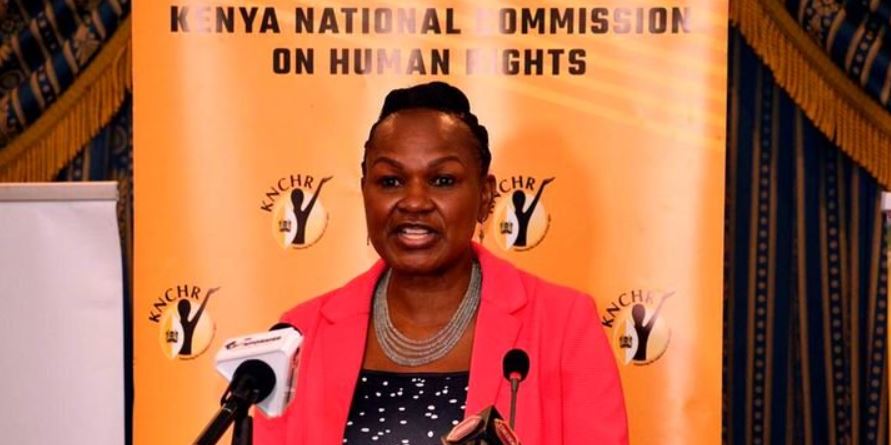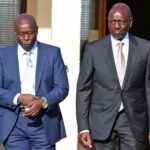
Besides your fight against extra-judicial killings and forced disappearances, what is your take on the other rights like access to water, shelter, a clean environment and education? Dan Murugu, Nakuru City
The constitution has been hailed as a transformative charter with a very progressive Bill of Rights including justiciable economic, cultural and social (Ecosoc) rights.
The KNCHR promotes and protects all rights enshrined in Chapter 4, including Ecosoc rights, and environmental and land rights, which are instrumental for each person to live a dignified life.
Whereas the country has policy and legislative documents to facilitate the enjoyment of these rights, much needs to be done especially in the health, housing, water, and sanitation sectors.
The KNCHR has conducted research on the right to better healthcare and made various recommendations to ensure increased enjoyment by all.
The KNCHR has been at the forefront of advocating for the adoption of the Dignity Bill which is meant to provide a framework for the realisation of Ecosoc rights.
So far Makueni and Kericho counties have enacted the Bill into county legislation.
When it comes to gender rights, who handles what between KNCHR and National Gender and Equality Commission (NGEC)? Sylvania G. Nkatha, Nairobi
Article 59 of the constitution establishes the Kenya National Human Rights and Equality Commission.
The same provision gives Parliament the leeway to restructure the commission into two or more entities thus the establishment of KNCHR, NGEC, and Commission on Administrative Justice (CAJ).
These commissions play a pivotal role in the advancement of human rights. However, it is important to note that all the commissions are distinct and separate in their mandate.
KNCHR’s mandate is to promote and protect general human rights whilst NGEC’s mandate is on equality and non-discrimination.
NGEC has been central in addressing societal norms contributing to the exclusion and marginalisation of special interest groups.
However, this has not stopped the KNCHR from continuing to complement the role of NGEC in the promotion of gender rights. The two institutions complement each other in the overall realisation of the bill of rights.
A teacher was recently accused of denying food to students with fees arrears while in another school, a pupil was caned for failing to attain 400 marks. How does your institution intervene in such scenarios? Komen Moris, Eldoret
We strongly and vehemently oppose any form of corporal punishment, torture, abuse, and/or violence perpetrated against children.
The Prevention of Torture Act (2017) gives the commission powers to not only investigate alleged violations of the Act but also to receive reports from public entities with respect to the implementation of the law and to work with enforcement agencies towards the promotion of compliance with international best practices and prevention of torture and cruel, inhuman or degrading treatment and punishment.
In some parts of this country, including urban settlements, the police are feared more than terror gangs. What became of police reforms? Komen Moris, Eldoret
The KNCHR Security Sector Reforms have been instrumental in advancing reforms within the wider security and law enforcement agencies.
To ensure oversight and accountability, the Internal Affairs Unit (IAU) and the Independent Policing Oversight Authority (IPOA) were established to investigate complaints by the police and the public against the police.
It is important to note that Article 37 of the constitution states that every person has the right, peaceably and unarmed, to assemble, demonstrate and picket.
This must be respected and adhered to by all law enforcement officers and agents, especially during this period of election campaigns.
Police officers should be able to isolate and arrest violent protesters who are in breach of peace and at the same time protect those who are innocent.
On August 17, last year, a man identified as Jetro Okwiri Obulo, 32, was shot dead by a forest ranger in Lugari forest, Kakamega County, on allegations of illegal logging. IPOA distanced itself from taking up the matter stating it was not within its mandate. Where can Okwiri’s family get justice? Francis Awiti, Kakamega
The right to life is sacrosanct as provided for under Article 26 of the constitution.
The commission has always been at the forefront to not only condemn such violations but also undertake the necessary protective and preventive measures to ensure that we do not have killings, especially those perpetuated by security agencies.
Based on the number of complaints received about such violations, the commission embarked on a partnership with Kenya Forest Service (KFS) aimed at enhancing a human rights-based approach to conservation.
From 2020, the commission has worked closely with KFS to develop a manual and curriculum on mainstreaming a human rights-based approach to forest conservation, protection, and management.
In its protection mandate, the commission is mandated to receive such complaints, investigate them and undertake the necessary redress action.
Any person can reach out directly to the commission via our toll-free line 0800720627, SMS platform 22359 or lodge complaints through our online platforms and physical offices. Information can be obtained from our website.
On October 8, last year, the UN Human Rights Council adopted Resolution 48/13 recognising that a clean, healthy and sustainable environment is a human right. In July, the UN General Assembly declared access to a clean healthy environment a universal human right. What action is your commission taking to advance and realise this new universal right for Kenyan children? Margaret Mwaura, Children’s Environmental Rescue
The commission’s mandate to realise children’s rights is informed by;
Article 59 2 (d) of the constitution and Section 8 of the KNCHR Act, 2011. It is mandated to receive complaints, investigate, redress, monitor and report on the observance of human rights in all spheres of life both public and private.
The UN General Comment No. 2 of 2002; speaks to the importance of the role of National Human Rights Institutions (NHRIs ) in the promotion and protection of the rights of the child.
This comment directed specific recommendations to the commission to put in place strategies and structures for the effective realisation of child rights.
The commission further has membership in national taskforces, advisory boards relevant to child rights protection and promotion as well as affiliate membership to regional mechanisms like the African Commission on human and people’s rights; and obligations bestowed by the Attorney-General.
With regards to persons with disability (PWD), KNCHR is the designated monitoring agency under the Convention on the Rights of Persons with Disability (CRPD) and continues to advocate for the enhancement of the PWDs Act to ensure equal enjoyment of human rights by all.
The commissioners of KNCHR were appointed in March, more than a year after the term of your predecessors ended. How are you catching up? Byron Amwai, Vihiga
The law with regards to the appointment of commissioners is very clear under Section 11 of the KNCHR Act, 2011 which calls for the recruitment process to commence 14 days after the seats fall vacant. However, this was not the case as the appointment of my team of commissioners took exactly two years.
Such a long absence of the policy arm of a constitutional body such as the KNCHR has negative repercussions on the optimum implementation of its mandate and the lack of compliance to international human rights instruments that Kenya has ratified.
This, therefore, prompted me and my team of commissioners who took office in March to hit the ground running and ensure that Kenya is on track with its human rights obligations.
Among the key areas of focus that I have led has been the identification of human rights priority areas across the country as the commission embarks on a process of developing its new strategic plan.
This being an election year, my commission is currently implementing an election monitoring project that has the main goal of promoting and protecting human rights in the elections.








